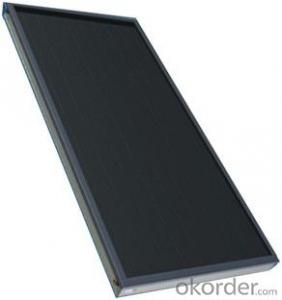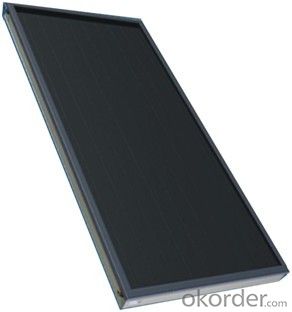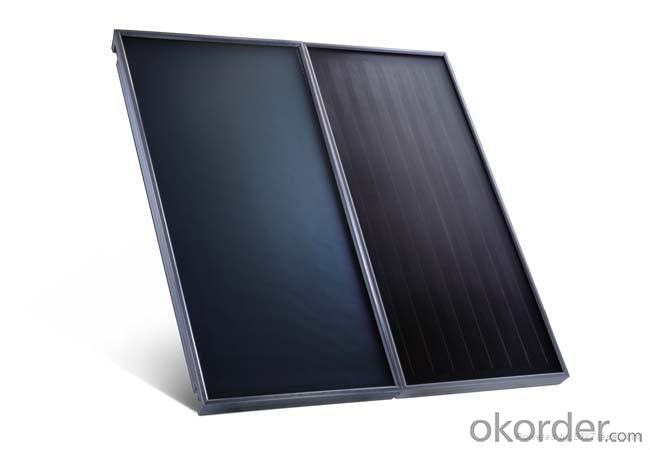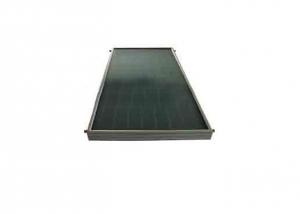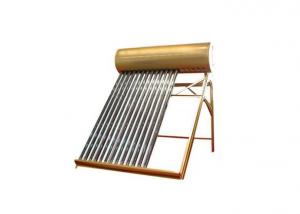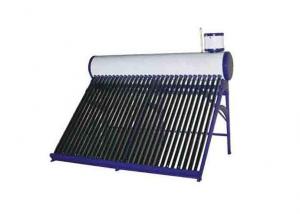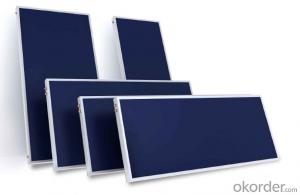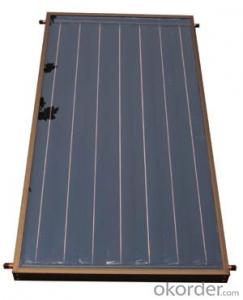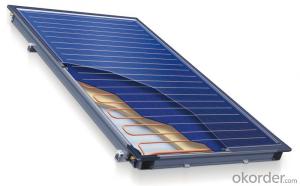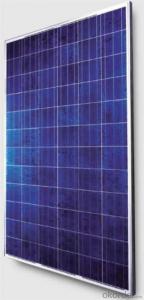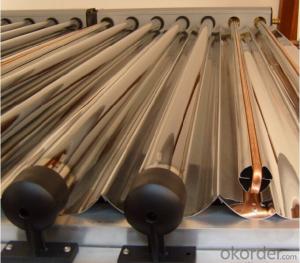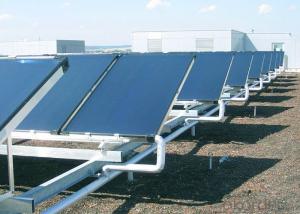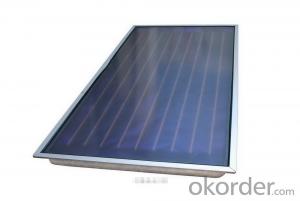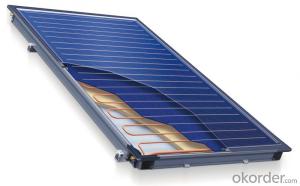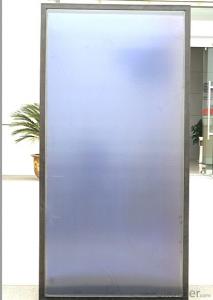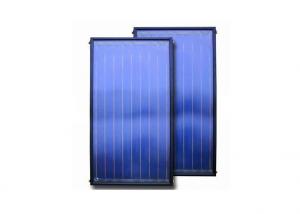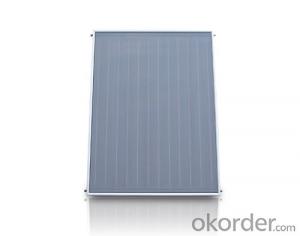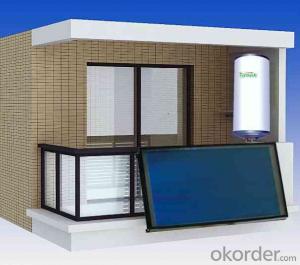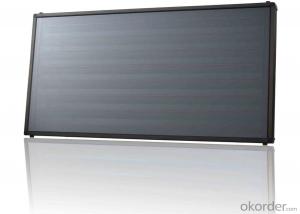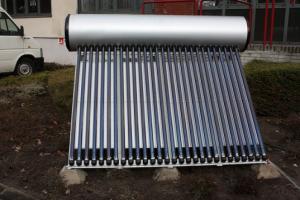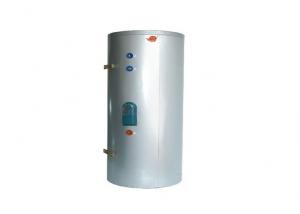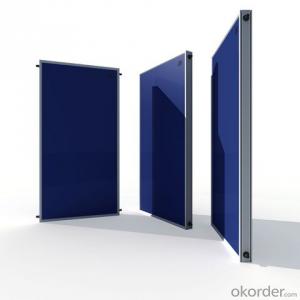Universal Solar Collectors:Flat Plate Solar Thermal Collectors with Black Chrome or Titanium
- Loading Port:
- Shanghai
- Payment Terms:
- TT OR LC
- Min Order Qty:
- 500 pc
- Supply Capability:
- 10000 pc/month
OKorder Service Pledge
OKorder Financial Service
You Might Also Like
Product Description:
Flat-plate collectors are commonly used in solar water-heating systems in homes and in solar space heating. A flat-plate collector consists basically of an insulated metal box with a glazed glass cover and a dark-colored absorber plate. Heat from the sun strikes the absorber plate and is transferred to a fluid that circulates through the collector in tubes.
Solar swimming pool heaters use a version of flat plate collectors that are much cheaper to produce. These panels have no insulated metal box or glazed glass cover. The absorber plate and tubes are usually manufactured from a plastic material rather than metal. As these panels are trying to raise a large volume of water by a few degrees, they depend on moving larger quantities of water. The high temperatures required for washing and other household chores, is not required.
A special type of unglazed collector called a perforated plate collector is used to preheat ventilation air for commercial buildings or for drying crops.
Flat collectors can be mounted in a variety of ways, depending on the type of building, application, and size of collector. Options include mounting on a roof, in the roof itself, or free-standing. The type of thermal system, drain-back or closed loop, can also have a big impact on how the panels are mounted. A drain-back system must ensure that all water is removed from the panels and tubing, if these systems are used in climates where freezing can occurr.
Solar thermal collector
.Competitive price and good quality
.CE,ISO9001
.5-15 years warranty
.24hours service
Solar thermal collector details:
Model: FD-NPC58-50G
Solar energy collector features
1. Temperature conservation layer in chest
2. Economical and practical
3. Environmental conservation and energy saving
4. According to the required configuration, it can be divided into two types, one is vertical and the other is horizontal
Solar thermal collector applications
1. Hotels, resorts, hospitals and hostels
2. Process industry, boiler feed, laundry and canteens
3. Agricultural sector, hatcheries and dairies
4. Process industry, Boiler feed, Laundry and canteens
5. Agricultural sector, hatcheries, and dairies
6. Swimming pool heating
7. In-process heating
- Q: Are there any limitations to the size of a solar collector installation?
- Indeed, the size of a solar collector installation is subject to various limitations. One such limitation pertains to the space available for installation. The installation of solar collectors necessitates a certain amount of space, and if the available area is restricted, the installation of a large-scale solar collector system may not be feasible. Another limitation concerns the quantity of sunlight or solar radiation accessible in a specific location. The electricity or heat generation of solar collectors relies on sunlight, so if an area experiences limited sunlight throughout the year, the installation of a large-scale solar collector system may not be practicable. Moreover, the cost associated with the installation and maintenance of a large-scale solar collector system can impose limitations. Larger installations necessitate more equipment, materials, and labor, thereby increasing the overall cost. Furthermore, the cost of maintaining, repairing, and cleaning a larger system may also be higher, potentially constraining the size of the installation. Additionally, limitations may arise from the electrical grid capacity and infrastructure. If the local electrical grid lacks the capacity to accommodate the additional energy generated by a large-scale solar collector system, connecting it to the grid may not be possible. Upgrading the grid infrastructure can be both costly and time-consuming, thereby restricting the size of the installation. Lastly, regulatory and zoning restrictions can also impact the size of a solar collector installation. Local regulations and zoning laws may impose constraints on the size or height of solar collector installations, thereby limiting their scale. In summary, while solar collector installations can be expanded to a certain extent, factors such as available space, sunlight availability, cost, electrical grid capacity, and regulatory constraints can impose limitations on their size.
- Q: What is the impact of air pollution on solar collector efficiency?
- The impact of air pollution on solar collector efficiency is primarily negative. Air pollutants such as dust, smog, and particulate matter can accumulate on the surface of solar panels, reducing their ability to absorb sunlight and convert it into electricity or heat. This buildup of pollutants can create a barrier between the sun and the solar cells, decreasing the overall efficiency and output of the solar collector. Regular cleaning and maintenance of solar panels are essential to mitigate the negative effects of air pollution and ensure optimal performance.
- Q: Can solar collectors be used for heating churches?
- Yes, solar collectors can be used for heating churches. Solar thermal systems can harness the energy from the sun to generate heat, which can then be used to warm up the interior spaces of churches. By installing solar collectors on the roof or nearby areas, churches can significantly reduce their reliance on traditional heating methods and lower their energy costs while promoting sustainable practices.
- Q: How do solar collectors handle temperature fluctuations?
- Solar collectors are designed to handle temperature fluctuations by using materials and components that can withstand high temperatures. They are typically made with durable materials such as tempered glass or metal that can handle extreme heat without warping or breaking. Additionally, solar collectors often incorporate insulation to help minimize heat loss during colder temperatures. Overall, these design features enable solar collectors to effectively capture and convert sunlight into usable energy regardless of temperature fluctuations.
- Q: Can solar collectors be used for generating electricity?
- Yes, solar collectors can be used for generating electricity.
- Q: Can solar collectors be used in electric vehicle charging stations?
- Yes, solar collectors can be used in electric vehicle charging stations. Solar panels can be installed at charging stations to generate clean and renewable energy from the sun, which can then be used to charge electric vehicles. This not only reduces the reliance on traditional power sources but also helps in minimizing greenhouse gas emissions and promoting sustainable transportation.
- Q: Can solar collectors be used in areas with limited technical support?
- Yes, solar collectors can be used in areas with limited technical support. Solar collectors are relatively simple devices that do not require complex maintenance or technical expertise. With proper training and basic knowledge, local communities can operate and maintain solar collectors effectively. Additionally, advancements in solar technology have made these systems more user-friendly and robust, allowing them to be utilized in remote areas with limited technical assistance.
- Q: Can solar collectors be used for generating electricity on lakes?
- Generating electricity on lakes is possible using solar collectors. These collectors, also referred to as floating photovoltaic (FPV) systems, are designed to be installed on bodies of water like lakes. They consist of solar panels placed on floating structures made of buoyant materials such as plastic or aluminum. Using solar collectors on lakes has several advantages. Firstly, lakes have large surface areas that receive ample sunlight, making them ideal for solar power generation. Additionally, floating solar panels maximize energy production and minimize land usage by utilizing the available water surface. Moreover, the cooling effect of water enhances the efficiency of solar panels as they perform better at lower temperatures. Water also acts as a natural cleaning agent, reducing the need for maintenance and ensuring optimal performance. Additionally, floating solar panels can help reduce water evaporation from lakes in arid regions. However, before installing solar collectors, it is crucial to consider the specific conditions of the lake. Factors such as water depth, water quality, and environmental impact assessments must be taken into account. Adequate anchoring systems are also necessary to ensure the stability of the floating structures in varying weather conditions. Overall, solar collectors offer an effective and sustainable solution for generating electricity on lakes, providing numerous benefits.
- Q: Can solar collectors be used for generating electricity on schools?
- Solar collectors are a viable option for generating electricity in schools. These devices, also referred to as solar panels or photovoltaic (PV) systems, convert sunlight into electrical energy using solar cells. To maximize exposure to sunlight, these panels can be installed on school rooftops or in nearby open spaces. By utilizing solar power, schools can generate clean and renewable electricity to meet various energy needs within the school premises, such as powering lights, computers, air conditioning, and other appliances. Moreover, excess electricity generated during sunny periods can be fed back into the local power grid, potentially earning credits or revenue for the school. The installation of solar collectors in schools not only reduces electricity costs and dependence on fossil fuels but also serves as an educational tool for students. Incorporating solar panel systems into the curriculum allows students to learn about renewable energy, climate change, and the significance of sustainability. Furthermore, solar collectors on schools act as visible symbols of environmental responsibility, inspiring the community to adopt renewable energy practices. Schools can take the lead in transitioning to a more sustainable future and encourage other institutions and individuals to follow suit. In summary, solar collectors are a practical means of generating electricity in schools, offering a clean, renewable, and educational solution to power school buildings while minimizing environmental impact.
- Q: Can solar collectors be used for heating vehicles?
- Solar collectors have the capability to heat vehicles. They are able to capture the sun's energy and convert it into heat. This heat can then be utilized for various purposes, including heating vehicles. By implementing solar collectors on the roof or other suitable areas of the vehicle, the energy collected from the sun can be used to warm the interior or even preheat the engine coolant. This helps to reduce the reliance on traditional heating systems and decrease the vehicle's impact on the environment by minimizing the use of fossil fuels. It should be noted, however, that the effectiveness of solar collectors for vehicle heating may vary depending on factors such as the size of the collectors, the amount of sunlight available, and the specific heating needs of the vehicle.
Send your message to us
Universal Solar Collectors:Flat Plate Solar Thermal Collectors with Black Chrome or Titanium
- Loading Port:
- Shanghai
- Payment Terms:
- TT OR LC
- Min Order Qty:
- 500 pc
- Supply Capability:
- 10000 pc/month
OKorder Service Pledge
OKorder Financial Service
Similar products
Hot products
Hot Searches
Related keywords
